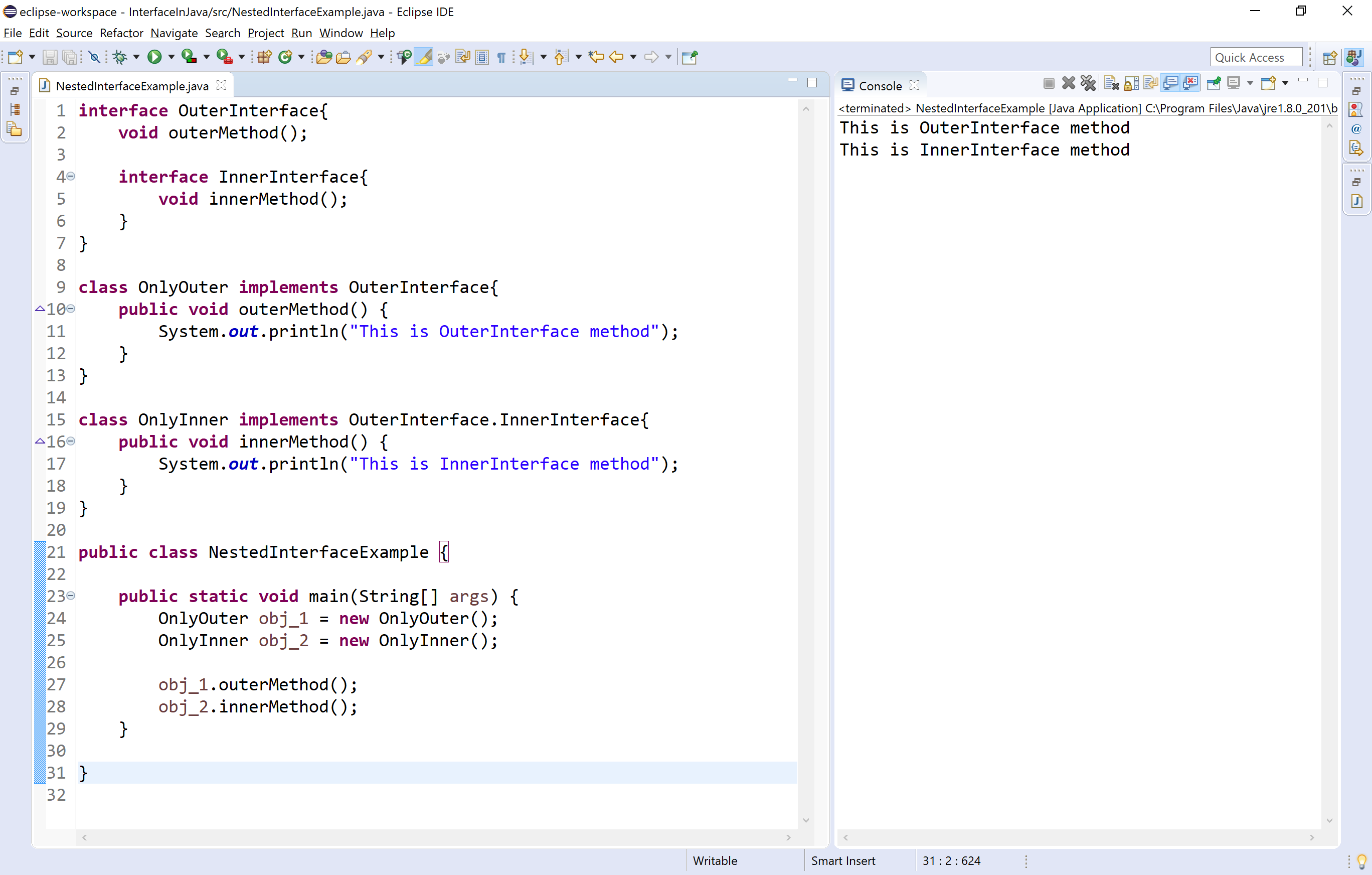

To summarize the answer to the question posted in the title of this post. !!!! The use of interfaces allows us to avoid tight coupling. We also want our duck to swim, to fly, and eat, by defining methods that are responsible for those actions, we define our duck’s behavior. We want our duck to have a name, color, and size, these are going to be describing the state(its properties or attributes) of our duck. (This is one of the four founding concepts - Abstraction - the other three are encapsulation, polymorphism, and inheritance). TestClass tc = new TestClass() //create an objectĪs already mentioned, by default, the interface methods are public.We start thinking about state and behavior of our duck that are relevant to what we want to accomplish in our program. if the access modifier is changed to any other, compiler generates error Void printMethod() //default visibility is public. Now let’s implement a Java program to demonstrate the interface method visibility. Note that we cannot use the following modifiers inside the interface for the interface methods. Since Java 8, its also possible to specify default implementations for. Hence if void printMethod() is the prototype that we intend to declare in an interface, then the following declarations are the same. An interface in Java is basically a way of specifying what methods a class should have. So whether we explicitly declare it or not, every method in the interface is by default abstract with public visibility. It is much similar to the Java class but the only difference is that it has abstract methods. java extension, with the name of the interface matching the name of the file. Interfaces are by default prefix with abstract keyword. Java Interfaces An interface is written in a file with a. No other access modifier is allowed to be used inside the interface. In Java, an interface is a blueprint or template of a class. An interface in java is a collection of fields and abstract methods (only method signature, no body). By rule, an interface can have only public methods or by default, interface methods are public. Since Java 8, you can also create default methods.
Java interface how to#
In this section, we will discuss how to declare interface methods. Interface in Java is a bit like the Class, but with a significant difference: an interface can only have method signatures, fields and default methods. Thus we do not need constructors for Interface. Secondly, as interfaces are by default abstract, we cannot create objects of the interface. Hence there is no use in calling these methods from the interface. One class can implement many interfaces One interface can be. The interface is a fully un-implemented class used for declaring a set of operations of an object. Real-life Example The real-world example of interfaces is that we have multiple classes for different levels of employees working in a particular company and the. The methods of interfaces are all abstract. Protocol for classes that completely separates specification/behaviour from implementation. The JAVA language doesn’t support multiple inheritances if we extend multiple classes in the class, but with the help of the interfaces, multiple inheritances are allowed in Java. But in the case of Interfaces in Java, the methods are not implemented. A class in Java can declare that it implements an.

We know that we need objects to invoke methods. An interface defines a set of methods that a class must implement. An abstract method is a method that does not have an implementation. The next question is whether an interface has a constructor? A Java interface is a collection of constants and abstract methods. By default, all the methods in the interface are public and abstract.Ī simple example of an interface in Java is given below. An interface is a kind of a protocol that sets up rules regarding how a particular class should behave.Īn interface in Java can contain abstract methods and static constants. Overview of Interfaces and Abstract Classes in Java – Part 2:Īn interface in Java is defined as an abstract type that specifies class behavior. Introduction to Interfaces and Abstract Classes in Java – Part 1: By using the implements keyword, a java class can implement an interface. Interfaces are used in Java to achieve abstraction. As one of Java's core concepts, abstraction, polymorphism, and multiple inheritance are supported through this technology. Video Tutorials On Interfaces And Abstract Classes In Java, an interface specifies the behavior of a class by providing an abstract type.


 0 kommentar(er)
0 kommentar(er)
